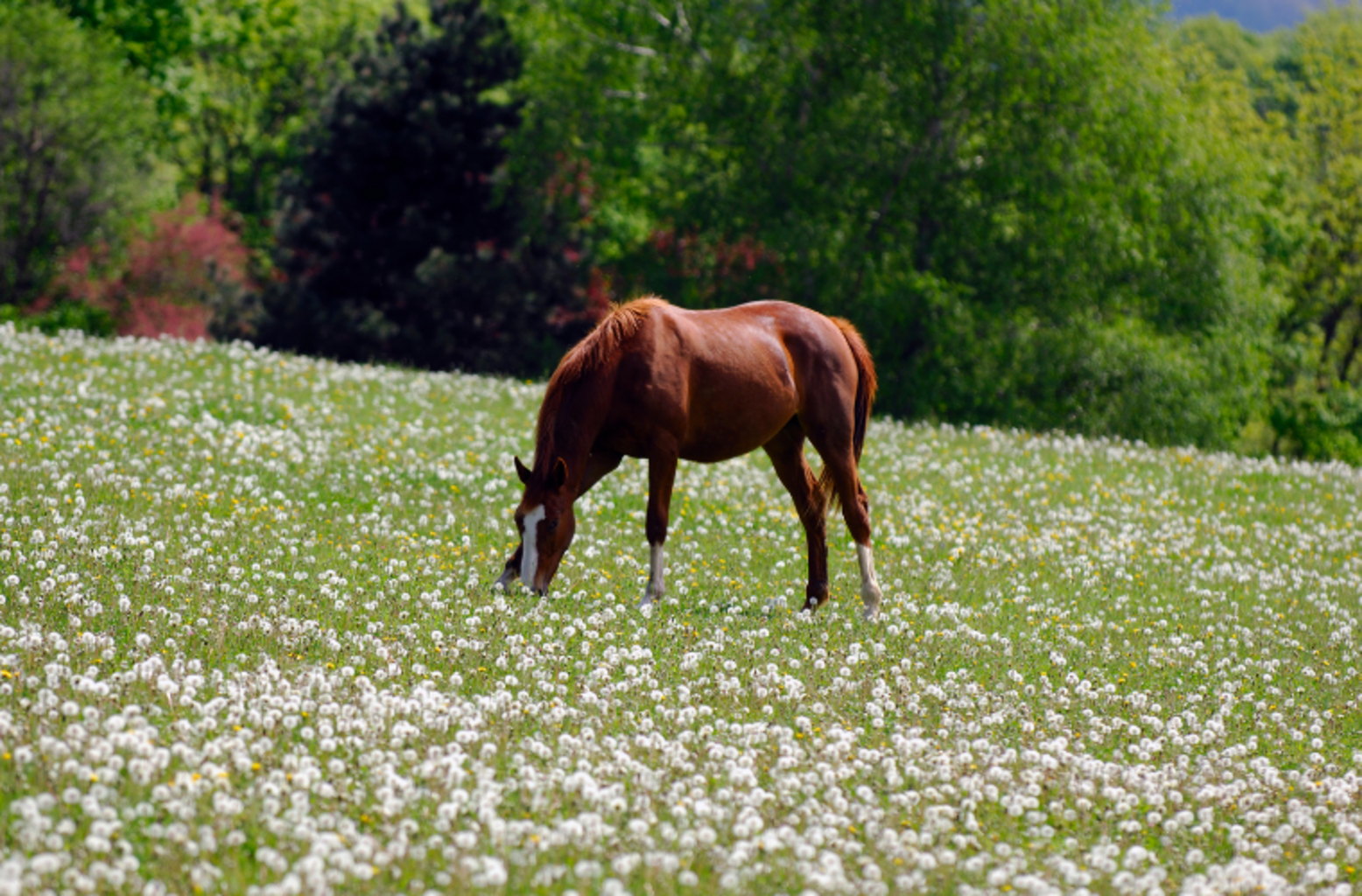Vitamins and trace elements
Small quantities – big effect
Bye Amelie Kokorsky
Two big words. But what is actually behind them?
The thing with vitamins
Vitamins are among the nutrients. Horses only need very small amounts of vitamins in relation to the amount of hay they eat. Despite these small amounts, it is important that they are available in sufficient form. It is not possible to say in general terms how many vitamins a horse needs, because the requirement varies greatly from vitamin to vitamin. Many vitamins are already contained in the horse's natural feed, such as pasture grass. However, as our horses are nowadays often kept on heavily loaded and/ or grazed pastures, it can happen that the horse gets a vitamin deficiency despite being kept on pasture. At the time of hay feeding over winter, the horse has considerably fewer vitamins available, because many vitamins are lost when the hay is dried.
The thing with trace elements
For optimal health, however, the horse needs not only vitamins, but also trace elements. Horses also need trace elements in very small quantities. The basic feed of hay and grass already provides some trace elements if the quality of the feed is good. However, this proportion can also be reduced by various factors.
Supplementary feeding of trace elements and vitamins can therefore be useful.
How do vitamins and trace elements influence the organism?
Vitamins and trace elements are involved in countless processes in the horse's organism. A deficiency can therefore also lead to different symptoms and clinical pictures. In order to build stable and resilient bones, the horse needs sufficient calcium. Young horses can often absorb and metabolise calcium very well, whereas in older horses the absorption capacity decreases. Just as important as calcium for the bone structure is zinc for the construction of the hoof horn. A deficiency of zinc is usually also reflected in the largest organ of the horse - the skin. A zinc deficiency can lead to changes in the skin in the form of eczema, thickening of the skin and/ or hair loss.
A zinc deficiency can also become noticeable through complications during the change of coat, because it is precisely at this time that there is an increased need for zinc. If this need is not sufficiently covered, it can often be observed that affected horses lose their coat more badly and/ or the new coat grows slower. In combination itching may occur. The horse may have flaky skin and start scratching more. These can be symptoms of a possible zinc deficiency.
However, zinc does not work alone in many processes in the body. Especially in the growth of new hoof horn, it needs its "team partners" biotin and methionine to be able to form an optimal and robust hoof horn.
Methionine is a particularly important amino acid for horses, which cannot be produced by the horse itself. Essential amino acids must be supplied with the feed in order to be available in sufficient quantities.
Another essential amino acid for horses is lysine. Lysine plays a significant role in growth, so lysine is very important especially for foals and young horses.
In the development of foals, one should also consider the administration of manganese. A deficiency can lead to growth disorders in young horses, among other things in the limbs. But adult horses can also benefit from manganese as it is involved in the growth of cartilage. A manganese deficit can lead to problems in cartilage metabolism and in acute cases can even be the cause of lameness.
The horse as a flight animal is equipped with many muscles in a healthy state. In order for the muscles to work optimally, the horse needs magnesium. During any kind of exercise, whether in competitive sport or during a relaxed ride, muscles need magnesium. Especially in summer, when horses sweat a lot and heavily, the need for magnesium increases, because not only water but also magnesium is lost through sweat.
On the subject of muscles, one should also always think of one of the most important muscles in every living creature - the heart. To maintain the health of the heart, the horse needs vitamin E. This vitamin can protect the heart and also all other cells from the so-called oxidative stress. Vitamin E can therefore be called the "vitamin of the muscles".
If there is a vitamin E deficiency, the muscles can lose performance. However, performance is not only dependent on vitamin E, but also on vitamin B. There is not only one vitamin B, however but a whole group of B vitamins. Without this vitamin B group, many biochemical processes in the horse's organism cannot take place. Symptoms of a deficiency include poor performance and fatigue, but changes in the skin in the form of eczema or hair loss can also occur. The B vitamins therefore also play a role in the annual change of coat of our four-legged friends.

How can I support my horse preventively with vitamins and trace elements?
For every horse, a species-appropriate management and a balanced basic supply of good quality hay and/ or grass are of course always important. If these factors are given, the horse's health can be optimized with additional feed.
If you have a horse that is prone to bone fractures, over-legs or tendon problems, you can carry out a bone density measurement and, if necessary, consider supplementing the feed with calcium. Stiefel Calcium can be used as a supplementary feed. It can help to compensate for calcium deficiencies. However, supplementary feeding of calcium should also be considered for foals or young horses to promote the growth of strong bones.
Not every trace element needs to be deficient before it is given. For some trace elements it is advisable to feed them preventively in certain situations. Zinc is a very good example, because before and during the change of coat the need for zinc increases significantly, so that it can make sense to feed zinc preventively around the time of the change of coat. The early administration of Stiefel Zink Plus can counteract a possible deficiency.
However, if the horse is already showing signs of a zinc deficiency such as eczema, hair loss or poor hoof horn, the administration of Stiefel Zink Plus can have a supporting effect. Stiefel Zink Plus contains mainly zinc in the form of zinc chelate, which is particularly well absorbed and metabolised by the horse.
As zinc also needs biotin and methionine for the hoof horn formation process, Stiefel Biotin Plus can be fed in addition if the horn quality is poor. All three main components of horn formation are contained in this product and can therefore promote the optimal formation of robust hoof horn.
If the horse lacks other important amino acids, Stiefel Amino Plus can be fed. All three essential amino acids are contained in this product, so that a deficiency of amino acids can be prevented or acutely counteracted.
Manganese plays an important role in the management and rearing of foals and young horses. Stiefel Mangan Plus can be fed as a supportive measure to prevent deformities in the musculoskeletal system of young animals. But older horses can also benefit from the administration of manganese, as manganese can support the cartilage metabolism and promote the health of the joints. In addition, manganese can have a positive effect on the willingness to perform and the energy balance.
Horses suffering from muscle cramps or tremors or psychological changes, such as rapid, excessive excitement or persistent nervousness, suggest a magnesium deficiency, often in combination with a deficiency of the amino acid L-tryptophan. In this case, the administration of Stiefel Mag Plus Liquid is suitable, as the high content of magnesium chloride and L-tryptophan contained can help to alleviate the symptoms.
In the case of sport & performance horses, one should always pay attention to a sufficient availability of vitamin E. It is an elementary vitamin when it comes to performance readiness and thus the health of the horse, especially the cells and the heart. Vitamin E deficiency symptoms can be very versatile. In young animals, for example, it can manifest itself in developmental disorders and weakness of the musculature. In broodmares, fertility may be reduced. Frequent infections as well as a weakened immune system can also result from a vitamin E deficiency. In these cases, Stiefel E-Plus or Stiefel E-Power Liquid can be fed as they can help to build antibodies and thus have a positive effect on the horse's health.
The symptoms of a vitamin E deficiency can sometimes be similar to the symptoms of a vitamin B deficiency, as a deficiency in the vitamin B group can also lead to tiredness and poor performance, as well as a weak immune system and a poor coat (during the change of coat). To treat or prevent a vitamin B deficiency, you can feed the horse a small portion of Stiefel Brewer's Yeast daily. Especially during the change of coat and at the beginning of the grazing season, brewer's yeast can support the change of coat and the intestinal flora. Stiefel Brewer's Yeast can have a positive effect on the horse's digestion and metabolism due to the valuable B vitamins, minerals and amino acids it contains on a natural basis and thus support feed conversion during the change of coat.
Stiefel Kieselgur contains essential vitamin B complexes and, in combination with the zinc content, can support the metabolism, especially the coat change. Deficiencies in vitamin B caused by feeding can also be compensated for with the administration of Stiefel Kieselgur.
The daily administration of mineral feed also belongs to the topic of horse feeding and especially to the need for vitamins and trace elements. The foundation of horse feeding is based on the pillars of optimal hay feeding and a good mineral feed. In the daily supplementary feeding, Stiefel Organic-Mineral can help to supply the horse with all vital substances as a preventive measure. In this mineral feed, the trace elements are organically bound and can therefore be quickly and easily absorbed by the horse's body. Stiefel Organic-Mineral has a high bioavailability. The mineral feed is suitable for all types of horses in the breeding, sport and leisure sector and even for horses with weight or metabolic problems.
Nevertheless, we would like to emphasise at this point that deficiencies can arise despite daily administration, because special situations in the lives of our horses sometimes also require special feeds. The time of the mare's lactation, the mating season of the stallions or the annually recurring change of coat season are such "special times" when we have to pay special attention to a good and sufficient feeding and in some cases should also resort to suitable supplementary preparations.
ATTENTION! Which feed belongs in the feeding trough at which time should always be decided individually, because vitamins and trace elements can also be overdosed. Therefore, each horse should be considered individually when choosing a supplementary feed. The age, the management, the basic feed, the exercise and above all the personal deficiencies should be taken into account and precisely determined. It does not make sense to feed every horse at the stable the same cocktail of high-dosed vitamins and/ or trace elements, because every horse has its very own needs for supplementary feed. If the wrong product is given, overdosing can occur on the one hand and on the other hand it often leads to frustration or disappointment on the part of the owner, because in such cases the expensively purchased supplementary feed does not bring the hoped-for benefit.
However, if missing vitamins and/ or trace elements are reliably identified and supplemented with the appropriate product, a positive change is often not long in coming.
If you are unsure about choosing the right product, simply consult a veterinarian or anmimal health practitioner you trust. Most of the time you will find a suitable solution for every problem.
The same principle of individual choice and dosage for supplementary products also applies to electrolytes. Every horse, regardless of whether it is a high performance or leisure horse, should be supplied with sufficient electrolytes (especially in summer).
Latest reviews
-
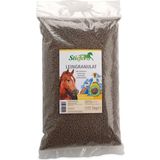 5.0 (7)
5.0 (7)Stiefel Linseed Granules, 5 kg
- Ready-to-feed linseed cake
- High mucilage content
- Reduced fat content due to cold pressing
£17.80 (£3.56 / kg)Delivery by January 09
-
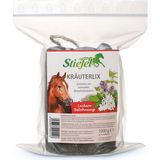 4.8 (10)
4.8 (10)Stiefel Kräuterlix Horse Lick, 1 kg
- Lick stone with bronchial herbs
- A tasty reward
- With attached cord to tie it up
£13.33 (£13.33 / kg)Delivery by January 20
-
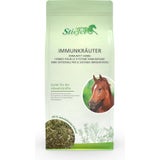 5.0 (8)
5.0 (8)Stiefel Immunity Herbs , 1 kg
New!- 100% natural herbal mixture
- Immunity herbs
- Good for the body's defences
£22.27 (£22.27 / kg)Delivery by January 09
-
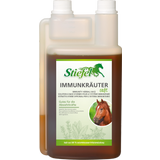 4.8 (6)
4.8 (6)Stiefel Immunity Herbal Liquid, 1 l
New!- To support the immune system
- Made of 100% natural herbs
- No added sugar
£15.12 (£15.12 / l)Delivery by January 09
-
Great Britain: Free standard delivery from £79.90
-
Free
returns Secure payments
with SSL encryption technology

